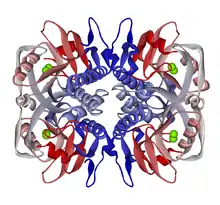Hypoxanthine-guanine phosphoribosyltransférase
L'hypoxanthine-guanine phosphoribosyltransférase (HGPRT) est une glycosyltransférase qui catalyse la réaction :
Hypoxanthine-guanine phosphoribosyltransférase

| N° EC | EC |
|---|---|
| N° CAS |
| IUBMB | Entrée IUBMB |
|---|---|
| IntEnz | Vue IntEnz |
| BRENDA | Entrée BRENDA |
| KEGG | Entrée KEGG |
| MetaCyc | Voie métabolique |
| PRIAM | Profil |
| PDB | RCSB PDB PDBe PDBj PDBsum |
| GO | AmiGO / EGO |
Cette enzyme intervient dans la voie de sauvetage des purines. Elle est fonctionnellement apparentée à l'adénine phosphoribosyltransférase (APRT). Les mutations du gène HPRT qui rendent l'enzyme inefficace sont à l'origine du syndrome de Lesch-Nyhan[2].
Notes et références
- (en) Wuxian Shi, Caroline M. Li, Peter C. Tyler, Richard H. Furneaux, Charles Grubmeyer, Vern L. Schramm et Steven C. Almo, « The 2.0 Å structure of human hypoxanthine-guanine phosphoribosyltransferase in complex with a transition-state analog inhibitor », Nature Structural Biology, vol. 6, , p. 588-593 (lire en ligne) DOI:10.1038/9376
- (en) Uros Hladnik, William L. Nyhan et Matteo Bertelli, « Variable Expression of HPRT Deficiency in 5 Members of a Family With the Same Mutation », Archives of Neurology, vol. 65, no 9, , p. 1240-1243 (lire en ligne) DOI:10.1001/archneur.65.9.1240
- (en) Sculley DG, Dawson PA, Emmerson BT, Gordon RB, « A review of the molecular basis of hypoxanthine-guanine phosphoribosyltransferase (HPRT) deficiency », Hum. Genet., vol. 90, no 3, , p. 195–207 (PMID 1487231)
- (en) Ansari MY, Dikhit MR, Sahoo GC, Das P., « Comparative modeling of HGPRT enzyme of L. donovani and binding affinities of different analogs of GMP », Int J Biol Macromol., vol. 50, no 3, , p. 637–49 (PMID 22327112, DOI 10.1016/j.ijbiomac.2012.01.010)
- (en) Davidson BL, Tarlé SA, Van Antwerp M, et al., « Identification of 17 independent mutations responsible for human hypoxanthine-guanine phosphoribosyltransferase (HPRT) deficiency », Am. J. Hum. Genet., vol. 48, no 5, , p. 951–8 (PMID 2018042, PMCID 1683055)
- (en) Stout JT, Caskey CT, « HPRT: gene structure, expression, and mutation », Annu. Rev. Genet., vol. 19, , p. 127–48 (PMID 3909940, DOI 10.1146/annurev.ge.19.120185.001015)
- (en) Sege-Peterson K, Chambers J, Page T, et al., « Characterization of mutations in phenotypic variants of hypoxanthine phosphoribosyltransferase deficiency », Hum. Mol. Genet., vol. 1, no 6, , p. 427–32 (PMID 1301916, DOI 10.1093/hmg/1.6.427)
- (en) Lightfoot T, Joshi R, Nuki G, Snyder FF, « The point mutation of hypoxanthine-guanine phosphoribosyltransferase (HPRTEdinburgh) and detection by allele-specific polymerase chain reaction », Hum. Genet., vol. 88, no 6, , p. 695–6 (PMID 1551676, DOI 10.1007/BF02265300)
- (en) Yamada Y, Goto H, Ogasawara N, « Identification of two independent Japanese mutant HPRT genes using the PCR technique », Adv. Exp. Med. Biol., vol. 309B, , p. 121–4 (ISBN 978-1-4615-7705-8, PMID 1840476, DOI 10.1007/978-1-4615-7703-4_27)
- (en) Sculley DG, Dawson PA, Beacham IR, et al., « Hypoxanthine-guanine phosphoribosyltransferase deficiency: analysis of HPRT mutations by direct sequencing and allele-specific amplification », Hum. Genet., vol. 87, no 6, , p. 688–92 (PMID 1937471, DOI 10.1007/BF00201727)
- (en) Tarlé SA, Davidson BL, Wu VC, et al., « Determination of the mutations responsible for the Lesch-Nyhan syndrome in 17 subjects », Genomics, vol. 10, no 2, , p. 499–501 (PMID 2071157, DOI 10.1016/0888-7543(91)90341-B)
- (en) Gordon RB, Sculley DG, Dawson PA, et al., « Identification of a single nucleotide substitution in the coding sequence of in vitro amplified cDNA from a patient with partial HPRT deficiency (HPRTBRISBANE) », J. Inherit. Metab. Dis., vol. 13, no 5, , p. 692–700 (PMID 2246854, DOI 10.1007/BF01799570)
- (en) Edwards A, Voss H, Rice P, et al., « Automated DNA sequencing of the human HPRT locus », Genomics, vol. 6, no 4, , p. 593–608 (PMID 2341149, DOI 10.1016/0888-7543(90)90493-E)
- (en) Gibbs RA, Nguyen PN, Edwards A, et al., « Multiplex DNA deletion detection and exon sequencing of the hypoxanthine phosphoribosyltransferase gene in Lesch-Nyhan families », Genomics, vol. 7, no 2, , p. 235–44 (PMID 2347587, DOI 10.1016/0888-7543(90)90545-6)
- (en) Skopek TR, Recio L, Simpson D, et al., « Molecular analyses of a Lesch-Nyhan syndrome mutation (hprtMontreal) by use of T-lymphocyte cultures », Hum. Genet., vol. 85, no 1, , p. 111–6 (PMID 2358296, DOI 10.1007/BF00276334)
- (en) Davidson BL, Tarlé SA, Palella TD, Kelley WN, « Molecular basis of hypoxanthine-guanine phosphoribosyltransferase deficiency in ten subjects determined by direct sequencing of amplified transcripts », J. Clin. Invest., vol. 84, no 1, , p. 342–6 (PMID 2738157, PMCID 303988, DOI 10.1172/JCI114160)
- (en) Ogasawara N, Stout JT, Goto H, et al., « Molecular analysis of a female Lesch-Nyhan patient », J. Clin. Invest., vol. 84, no 3, , p. 1024–7 (PMID 2760209, PMCID 329751, DOI 10.1172/JCI114224)
- (en) Yang TP, Stout JT, Konecki DS, et al., « Spontaneous reversion of novel Lesch-Nyhan mutation by HPRT gene rearrangement », Somat. Cell Mol. Genet., vol. 14, no 3, , p. 293–303 (PMID 2835825, DOI 10.1007/BF01534590)
- (en) Fujimori S, Hidaka Y, Davidson BL, et al., « Identification of a single nucleotide change in a mutant gene for hypoxanthine-guanine phosphoribosyltransferase (HPRT Ann Arbor) », Hum. Genet., vol. 79, no 1, , p. 39–43 (PMID 2896620, DOI 10.1007/BF00291707)
- (en) Davidson BL, Pashmforoush M, Kelley WN, Palella TD, « Human hypoxanthine-guanine phosphoribosyltransferase deficiency. The molecular defect in a patient with gout (HPRTAshville) », J. Biol. Chem., vol. 264, no 1, , p. 520–5 (PMID 2909537)
- (en) Fujimori S, Davidson BL, Kelley WN, Palella TD, « Identification of a single nucleotide change in the hypoxanthine-guanine phosphoribosyltransferase gene (HPRTYale) responsible for Lesch-Nyhan syndrome », J. Clin. Invest., vol. 83, no 1, , p. 11–3 (PMID 2910902, PMCID 303636, DOI 10.1172/JCI113846)
- Portail de la biochimie
Cet article est issu de Wikipedia. Le texte est sous licence Creative Commons - Attribution - Partage dans les Mêmes. Des conditions supplémentaires peuvent s'appliquer aux fichiers multimédias.